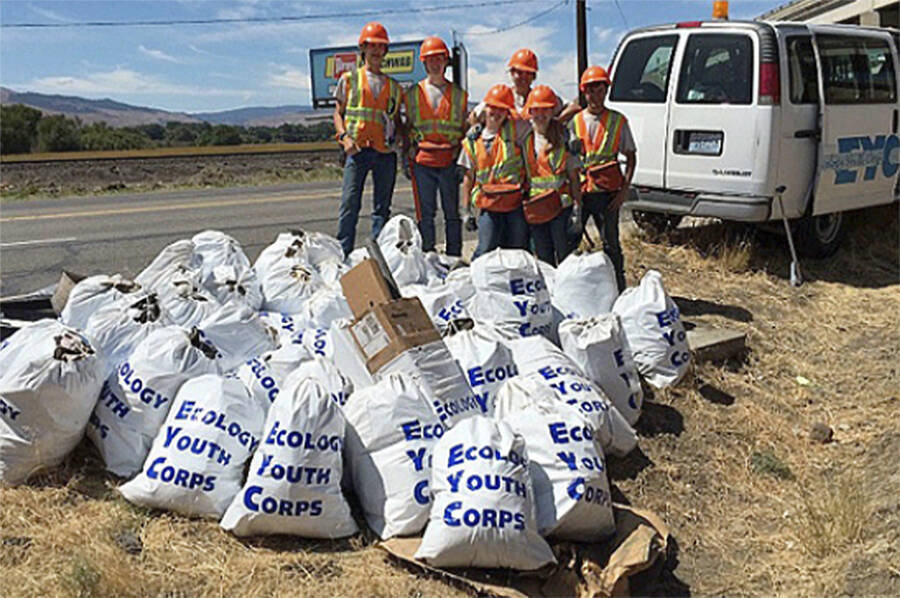If you think you’ve been seeing more litter along roadsides – especially the past two years during the COVID-19 pandemic – you’d be right.
The reason is simple. “There are not as many people cleaning it up,” said Caitlin Newman of the Kitsap County Public Works solid waste division.
COVID restrictions have resulted in fewer volunteer and inmate crews picking up litter along roadsides and elsewhere. Newman said while Department of Corrections crews never worked on Bainbridge Island they have done a lot of work in much of the rest of the county since 1984. But that program came to an end in August due to a lack of eligible inmates.
But with masking mandates ending, Newman said the county plans to again start recruiting individuals, groups, businesses and so on to adopt not only highways and roads, but also beaches, park, trails and more to clean up the county.
“We’re re-thinking the Clean Kitsap program,” she said, adding it will now have full-time rather than part-time staff so it can be more successful. It is also being rebranded with a new website to make it as easy as possible for volunteers. There will be an online map so people can see which roads are adopted and which are not, she said. People with community service requirements and a roving group of hired employees will clean up areas that are not adopted.
In 2020, 16 people and eight groups spent 508 hours removing 539 bags of litter from 379 road miles in the county.
“We had a small cadre of dedicated volunteers who moved away or with whom we’ve lost touch,” Newman said, adding they plan to “double down” on organizing people interested in helping. “We get inquiries every day.”
Newman said other than COVID masks and liquor bottles litter isn’t much different than before. Garbage flying out of trucks causes the most problems. She said if people would just put tarps over garbage and strap them down much of the problem would be solved.
“Most folks have pride in community and want to set a good example for the people in their lives,” she said, adding those who don’t must not be connected to community. “I don’t understand it.”
In general, Newman said BI is kept pretty clean, and she also wanted a “shout out to Hansville. Those folks are pristine.”
Bainbridge Island
Except for the Winslow area, littering hasn’t been much of a problem on Bainbridge Island, city manager Blair King said.
The city has eight Bigbelly solar trash receptacles in Winslow and is waiting for two more to arrive. Bainbridge Disposal services the trash receptacles weekdays, and the city handles trash service on weekends. The city empties the Bigbelly receptacles and seven traditional trash bins in Winslow three times a day on weekends during summer.
The City Council approved a new position for Operations and Maintenance that will primarily be dedicated to landscape and facilities services in Winslow.
Poulsbo
Public Works superintendent Mike Lund said he has noticed more litter the past few months, especially on Highway 3. “I don’t know if people are just throwing trash out their windows or what,” he said.
In Poulsbo proper, Lund said litter cleanup is done by city staff and volunteer groups like Homeowner Associations, the Boy Scouts and Rotary. While there is no official Adopt-a-Spot program, if someone wants to clean up an area the city will provide litter bags and then pick them up when they are filled.
The city recently had a crew picking up litter along Highway 305 in Poulsbo. But Lund said during COVID there has been less of that. He said with restrictions being pulled back he’s hoping he can hire a seasonal crew of six to eight people, rather than the one or two who have been performing that function the past two years.
State program
Every year the state Department of Transportation spends over $3 million cleaning up more than 3,000 tons of debris and litter on state highways. The state Department of Ecology assists WSDOT with their own cleanup crews and with funding to other counties, cities and state agencies.
Steven Williams of the DOE’s Northwest Regional office agreed with Newman that fewer resources has meant more litter. He said their summer teen litter cleanup crews were suspended the past two years. Their adult crews were cut in size to maintain social distancing in work vehicles to reduce possibility of COVID transmission. Also DOT’s commercial and volunteer adopt-a-highway programs were suspended for a time and fewer groups returned once restrictions were lifted.
“Ecology is hopeful we will start to see improvement in roadside litter,” Williams wrote in an email. “All of the suspended activities…are scheduled to return in 2022.”
Those efforts include 12 Ecology adult cleanups, each with up to four crew members, rather than the one allowed during COVID. One of the crews will be based in Kitsap County.
“I don’t have the specifics, but I also know Kitsap County has had increasing difficulty operating their county-level cleanup crews,” he said, adding DOE provides the county with roughly $200,000 through a grant program to clean up litter and illegal dumps.
Williams said fines ranging from $103 to $5,000 are possible for littering in Washington, but Newman said those laws are very hard to enforce.
”The largest fines are for ‘lit debris’ — primarily cigarettes — and items that can cause car crashes,” Williams said.
Littering fines
Throwing or depositing litter on the highway, $231.
Failure to secure load, $231 (If something falls out and you cause property damage or injure another person you can be fined up to $5,000 and may be charged with a gross misdemeanor, including up to a year in jail).
Littering less than 1 cubic foot, $103.
Litter more than 1 cubic foot, but less than 1 cubic yard, $500.
Littering more than 1 cubic yard, $1,000-$5,000 and potential jail time.
Potentially dangerous litter (including cigarette butts), $1,025.



